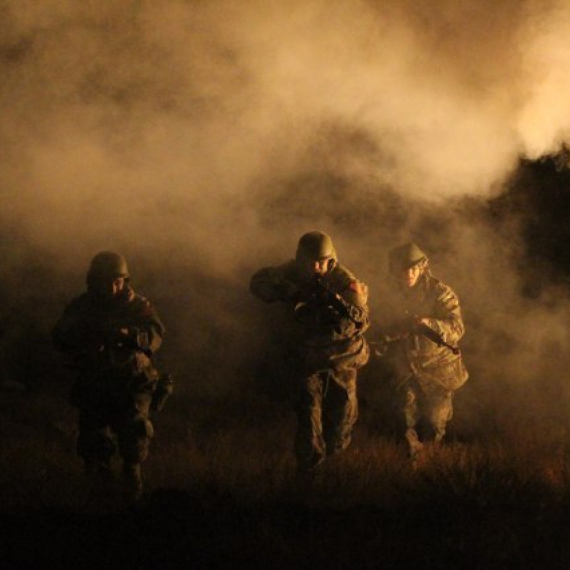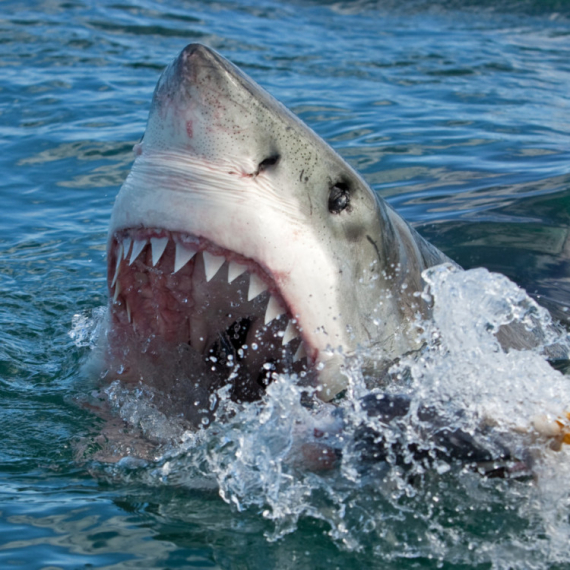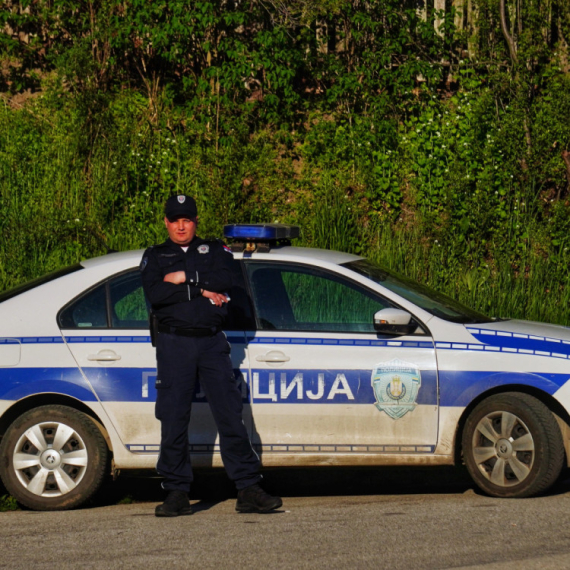Turkey stages new air attack on Kurd rebels in Iraq
Turkey's army said it attacked Kurdish separatists in northern Iraq for the third time in less than a week.
Sunday, 23.12.2007.
10:36

Turkey's army said it attacked Kurdish separatists in northern Iraq for the third time in less than a week. The army bombed and shelled positions yesterday and warned more would follow. Turkey stages new air attack on Kurd rebels in Iraq "Turkish aircraft attacked between 1:35 pm and 2:00 pm (1125-1200 GMT) major positions of the terrorist organization" PKK, before Turkish artillery shelled the area for 15 minutes, the military said in a statement on its website. It gave no details on targets, saying more information would be given next week and that it would carry out more operations despite harsh winter conditions in the mountainous region. The Turkish television channel NTV said the raids were in the Amadiyah area of northern Iraq. "It will become well understood how effective the operations against the terrorist operations are," the military's statement said. The PKK "no longer has a chance of success" against the Turkish army. Actions over recent weeks had left "hundreds of terrorists" dead, it added. In northern Iraq, Jabbar Yawar, spokesman for the Iraqi Kurdish Peshmerga security force, said Turkish warplanes had hit isolated Kurdish villages. "In the afternoon Turkish warplanes entered northern Iraqi airspace in an area called Al-Amadiyah. Later at around 4:00 pm they bombed Iraqi Kurdish villages. We do not know the extent of damage. But these areas are largely deserted and are along the border with Turkey," Yawar told AFP. The Kurdistan Workers' Party (PKK), listed as a terrorist group by Turkey and many other countries, has waged a bloody campaign for Kurdish self-rule in southeast Turkey since 1984. The conflict has claimed more than 37,000 lives. Turkey has been stepping up pressure since its parliament approved in October cross-border raids on PKK bases, with Ankara saying the Iraqi government and its U.S. backers were not doing enough to halt PKK attacks. Asked for a reaction, State Department spokeswoman Nicole Thompson said in Washington: "The U.S. does view the PKK as a terrorist group and is against any acts of violence against Turkey or Iraq. It will continue to work with the governments of Turkey and Iraq on how they can work together to deal with the PKK." The new raid follows air attacks on December 16 on the Qandil mountains near the border with Iran where Ankara says some 3,500 PKK rebels are holed up, using the area as a springboard for attacks on Turkey. On Tuesday, Turkish troops penetrated into northern Iraq from the southeast Turkish province of Hakkari, the army said. Iraqi officials said about 500 Turkish troops took part in the ground operation. Ankara has accused Iraqi Kurds, who run an autonomous administration in the north of the country, of tolerating and even supporting the PKK. Turkey, which has the second largest army in the NATO military alliance after the U.S. with 515,000 troops, has moved around 100,000 soldiers up to its 380-kilometre (230-mile) border with Iraq. The United States fears that Turkey could launch a major cross-border operation and destabilize the relatively peaceful northern part of Iraq. After a flurry of diplomatic activity, Iraq has promised to rein in the PKK and in November U.S. President George W. Bush said Washington would provide Ankara with information on rebel movements from its satellites. The U.S. administration said Wednesday that it had been informed about the December 16 raids in advance. Turkish chief of staff General Yasar Buyukanit said earlier that the United States approved the December 16 air raids by providing "intelligence" and opening Iraqi airspace. On Tuesday the president of Iraq's Kurdish region, Massud Barzani, refused to meet visiting U.S. Secretary of State Condoleezza Rice in Baghdad in protest at U.S. support for Turkey's strikes, a top Kurdish official said. Ankara has denied that civilians were hit on December 16, blaming reports of villages being bombed and hospitals and schools destroyed on PKK sympathizers among Iraqi officials seeking to mislead the international community. The UN refugee agency has said that around 1,800 people fled their homes in Sulaimaniyah and Erbil provinces in northern Iraq following the attacks.
Turkey stages new air attack on Kurd rebels in Iraq
"Turkish aircraft attacked between 1:35 pm and 2:00 pm (1125-1200 GMT) major positions of the terrorist organization" PKK, before Turkish artillery shelled the area for 15 minutes, the military said in a statement on its website.It gave no details on targets, saying more information would be given next week and that it would carry out more operations despite harsh winter conditions in the mountainous region.
The Turkish television channel NTV said the raids were in the Amadiyah area of northern Iraq.
"It will become well understood how effective the operations against the terrorist operations are," the military's statement said. The PKK "no longer has a chance of success" against the Turkish army.
Actions over recent weeks had left "hundreds of terrorists" dead, it added.
In northern Iraq, Jabbar Yawar, spokesman for the Iraqi Kurdish Peshmerga security force, said Turkish warplanes had hit isolated Kurdish villages.
"In the afternoon Turkish warplanes entered northern Iraqi airspace in an area called Al-Amadiyah. Later at around 4:00 pm they bombed Iraqi Kurdish villages. We do not know the extent of damage. But these areas are largely deserted and are along the border with Turkey," Yawar told AFP.
The Kurdistan Workers' Party (PKK), listed as a terrorist group by Turkey and many other countries, has waged a bloody campaign for Kurdish self-rule in southeast Turkey since 1984. The conflict has claimed more than 37,000 lives.
Turkey has been stepping up pressure since its parliament approved in October cross-border raids on PKK bases, with Ankara saying the Iraqi government and its U.S. backers were not doing enough to halt PKK attacks.
Asked for a reaction, State Department spokeswoman Nicole Thompson said in Washington: "The U.S. does view the PKK as a terrorist group and is against any acts of violence against Turkey or Iraq. It will continue to work with the governments of Turkey and Iraq on how they can work together to deal with the PKK."
The new raid follows air attacks on December 16 on the Qandil mountains near the border with Iran where Ankara says some 3,500 PKK rebels are holed up, using the area as a springboard for attacks on Turkey.
On Tuesday, Turkish troops penetrated into northern Iraq from the southeast Turkish province of Hakkari, the army said. Iraqi officials said about 500 Turkish troops took part in the ground operation.
Ankara has accused Iraqi Kurds, who run an autonomous administration in the north of the country, of tolerating and even supporting the PKK.
Turkey, which has the second largest army in the NATO military alliance after the U.S. with 515,000 troops, has moved around 100,000 soldiers up to its 380-kilometre (230-mile) border with Iraq.
The United States fears that Turkey could launch a major cross-border operation and destabilize the relatively peaceful northern part of Iraq.
After a flurry of diplomatic activity, Iraq has promised to rein in the PKK and in November U.S. President George W. Bush said Washington would provide Ankara with information on rebel movements from its satellites.
The U.S. administration said Wednesday that it had been informed about the December 16 raids in advance.
Turkish chief of staff General Yasar Buyukanit said earlier that the United States approved the December 16 air raids by providing "intelligence" and opening Iraqi airspace.
On Tuesday the president of Iraq's Kurdish region, Massud Barzani, refused to meet visiting U.S. Secretary of State Condoleezza Rice in Baghdad in protest at U.S. support for Turkey's strikes, a top Kurdish official said.
Ankara has denied that civilians were hit on December 16, blaming reports of villages being bombed and hospitals and schools destroyed on PKK sympathizers among Iraqi officials seeking to mislead the international community.
The UN refugee agency has said that around 1,800 people fled their homes in Sulaimaniyah and Erbil provinces in northern Iraq following the attacks.




































Komentari 10
Pogledaj komentare